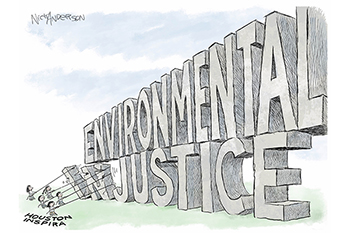Concrete Batch Plants
Bill Sponsors / Authors:
![]() Sen.
Borris Miles
Sen.
Borris Miles
D - Houston
Supporting Documents / Links:
- Dr. Loren Hopkins testimony before Senate Committee on Natural Resources & Economic Development
April 26, 2023 - Restriction on concrete batch plants stall in Texas Legislature, but modest reforms advance
Houston Chronicle - April 28, 2023 - Houston Black and Hispanic Neighborhoods Fight Back
Reform Austin - May 1, 2023
 Senate Bill 179 – Cumulative Impacts
Senate Bill 179 – Cumulative Impacts
Under current standards, the Texas Commission on Environmental Quality (TCEQ) judges a concrete batch plant’s impact only based on its own emissions. The lack of a cumulative impact has allowed multiple plants to cluster close together, which increases the impact to neighborhoods while allowing individual plants to be permitted as if they were the only ones producing an air quality impact.
Senator Borris Miles, author of SB 179 understands this issue intimately as his Senate District is impacted by the concentration of multiple plants. He stated during committee:
“Dust and particulate matters created by these facilities don’t just stay in one place. They float around and mingle with dust and particulate matters made by other nearby facilities. There is no way to tell whose dust is whose. While these plants and facilities can point fingers at each other and escape the blame, it is regular people that suffer.”
Add to the the lack of land use regulation in the City of Houston– often referred to as “zoning” – has allowed companies to freely build concrete batch plants with more than half of the facilities located in neighborhoods of low-income people of color.
- The Houston Chronicle found that 54 percent of the mixing sites are in neighborhoods dominated by people of color.
Senate Bill 179 would have ensured that communities are protected from the cumulative emissions of several facilities. Additionally, SB 179 would have required the TCEQ to consider the cumulative air effects of the proposed facility and neighboring facilities when evaluating an initial preconstruction permit or preconstruction permit renewal.
Specifically, TCEQ would consider the cumulative effects of air contaminants on the public's health and property from the proposed facility and all facilities within three miles.
The entire purpose for permits for concrete batch plants aim to limit pollution in the form of particulate matter, crystalline silica, carbon monoxide and other air toxins that have been linked to respiratory diseases and cancer.
- Studies by the Houston Health Department have traced human health risks including asthma attacks, cardiac arrest, stroke, and premature death due to the inhalation of fine particulate matter emitted into the air from these sites.
Testimony by Dr. Loren Hopkins shows the dramatic health impacts that neighborhoods with high concentrations of batch plants have on asthma rates along with other major health impacts like stroke and cardiac arrest.
After a very in-depth hearing, the bill was left pending in the Senate Natural Resources & Economic Development hearing.